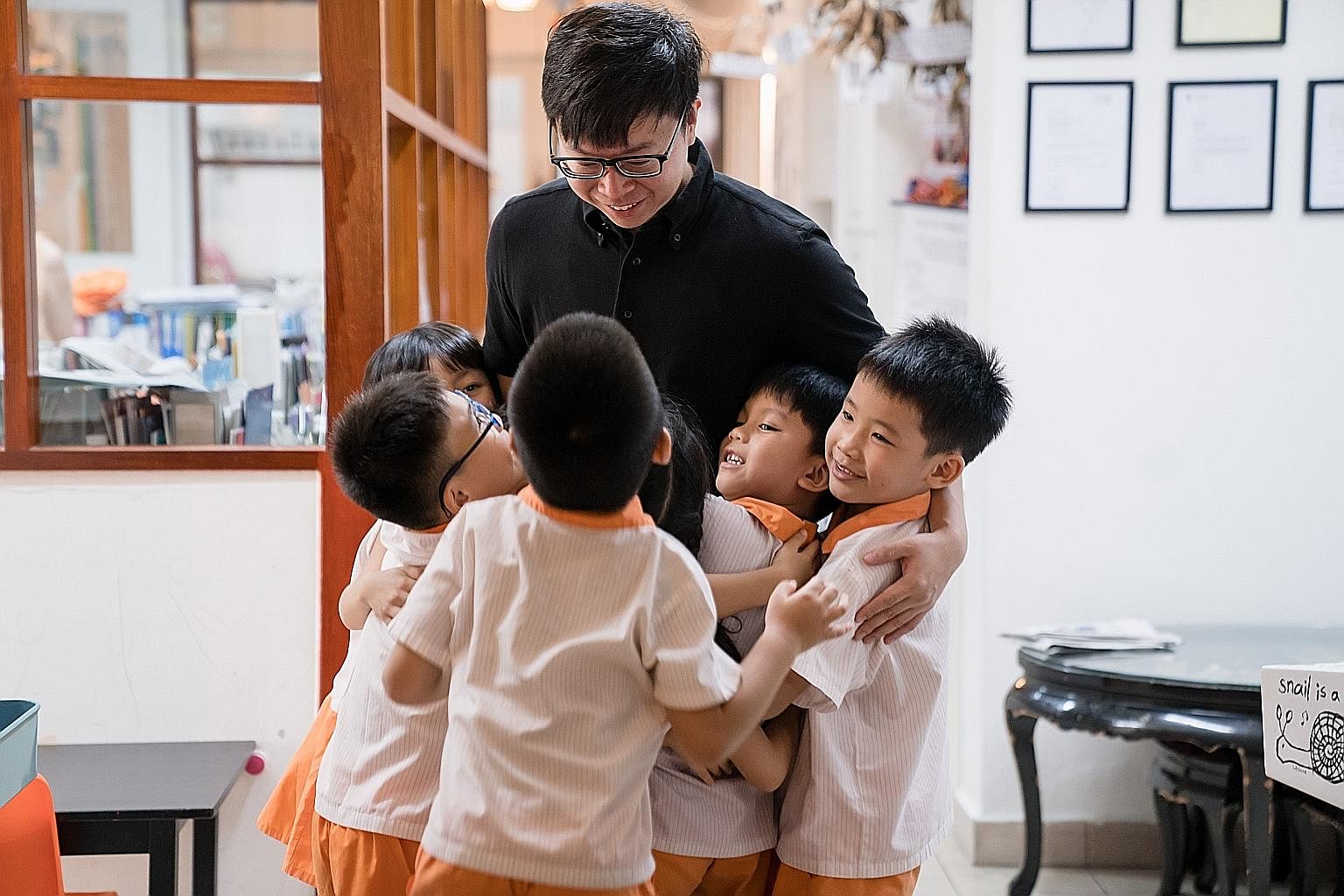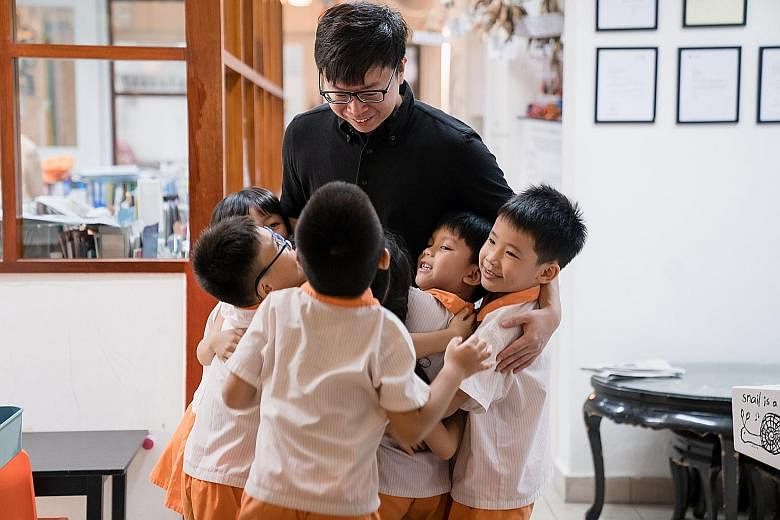Today, allow me to think aloud about music.
Music? Why music, you say?
Well, friends, simply because there's been quite enough of those doleful sounds, as the great Ludwig van Beethoven might say, of infections and deaths from the coronavirus that is ravaging societies around the world.
What we need now, as the German composer declared in the Ode To Joy, that rousing finale to his well-loved Ninth Symphony, is some more "cheerful songs, full of joy".
Sounds of the triumph of the universal brotherhood of man, and music that speaks of the joys of life, friendship and togetherness, all so sorely missed in these days of lockdowns and isolation.
Lamentably, in these trying times, instead of coming together, we see leaders obfuscating and bickering, at odds over how it all began and just what might be done together to bring the global pandemic to an end.
Little wonder then that many are turning to music - not just Beethoven's, but just about any kind of music, from The Beatles to Bieber and Beyonce - causing downloads and streaming services to enjoy a surge, even as others dust off old CDs and records, in an effort to lift moods, inspire hope, and perhaps ignite that spark which binds all men as brothers and joins them with the gods, as the Ode To Joy proclaims.
Beethoven completed his Ninth Symphony in 1824, when he was almost totally deaf - imagine that! - and this stupendous masterpiece was declared part of the world's cultural heritage in 2003 by Unesco. Music lovers around the world have also been marking Beethoven's 250th birthday this year. So there can hardly be a more fitting rallying cry in these testing times.
Which is why The Straits Times has partnered with the young Singaporean conductor Wong Kah Chun, as well as the National Arts Council and the German Embassy in Singapore, to present a virtual performance of this piece, bringing together performers young and old, professional and amateur, Asian and Western, from just about everywhere around the world.
A teaser recording of this was unveiled on May 7, the very day the piece was first performed in 1824, in a shout-out to all who wish to join in the resounding chorus. These inputs will be used for a rendition of the Ode To Joy, to be presented on July 15, to mark the 175th anniversary of The Straits Times.
This project will culminate in a grand finale, presented by the German Embassy in Singapore, in which the whole fourth movement of the piece will be played on July 30, to mark International Friendship Day. The QR link below provides information on how you might join this happy band of performers, if you are so inspired.
INFINITUDE OF JOY
I first met Kah Chun several years ago when I was invited by an old ST colleague, Ms Nirmala Murugaian, to attend one of his Red Bean concerts. It was held one Saturday morning at the Child at Street 11 centre, a multiracial, secular and non-profit education centre for less fortunate children, which Nirmala had founded in 1994.
I found myself transfixed, not just by the music performed on Western and Chinese orchestral instruments, but also the way the children, some aged no more than four or five, and many from modest households, were relishing the experience. Some sat quietly and listened contemplatively; others danced and pranced about the room, carefree and oblivious to the foolishly fastidious adults around them.
Afterwards, Kah Chun and the children served everyone a bowl of homemade red bean soup, a riff on the "cocoa concerts" - an interactive musical experience for autistic children, usually rounded off with a cup of hot cocoa - which were the brainchild of Hungarian conductor Ivan Fischer and his Budapest Festival Orchestra.
A few weeks later, I invited myself back to the centre, tucked away in the void deck of Block 102 Ang Mo Kio Avenue 3, to learn more about Project Infinitude, a collaboration that Kah Chun and Nirmala had dreamed up, to try to enrich their young charges' lives with music, including classical music.
I was intrigued to discover that the children often listened to composer Gustav Mahler's Fifth Symphony to while away the long afternoons at the cosy childcare centre. After listening to the soul-wrenching slow movement from the piece, which has been featured in popular movies and state memorial services, some of the young ones had pronounced, without prompting, that it "must be about love!".
Admittedly, I was a little sceptical initially when told that these young ones had also attended and sat through orchestral concerts at the Esplanade, until I saw pictures of them in the hall, in rapt attention.
Kah Chun, with his boyish, bespectacled countenance and ruffled mop of hair, was a natural with the kids, engaging them - talking with, not to, them - about music, what it meant to him, and how it inspired his journey to becoming chief conductor of an orchestra in Nuremberg, Germany. This is a world away from his own humble beginnings in a Housing Board household in Jurong West, to which he returned recently in the face of the current virus outbreak.
HUMBLE BEGINNINGS
What prompted him to embark on this project, I asked him recently.
Here he is, in his own words: "I recognised from quite a while back, that I have been very lucky to have met the right people in my life who led me to the right opportunities in exploring music. Coming from a humble family myself, it is important for me to do the same and open similar windows into the arts, especially for children from under-resourced backgrounds."
His aim, he says in his ever earnest, down-to-earth way, is not so much to foster a new generation of music professionals. Rather, his hope is to enrich these young lives, with music, as his was too.
"I believe music can be a conduit for children to discover the world, and to develop skills such as listening, respect and empathy. It helps to deepen the power of imagination in our children."
Music, he insists, should be shared with all. It can be enjoyed by anyone open to experiencing its power to move, to joy and even to tears.
"When I listen to a really great version of Tchaikovsky's Pathetique Symphony, tears fall at certain spots in the music because it is overwhelmingly moving and sad. After the experience, I feel shiok.
"It is like watching a really great drama on TV, where the story is so well paced and well told. I want to share these emotional experiences with other people, and I have discovered that it is easier with children than with adults, because they don't yet have preconceptions and are generous in exploring their own musical tastes."
MUSIC FOR ALL
For her part, Nirmala says that it was Kah Chun's pitch for musical inclusiveness that won her over to the project.
"Kah Chun spoke to my teachers and me about his ideas on making classical music inclusive and accessible to all. Classical music shouldn't be for the privileged and well-heeled. It should include all, especially the children who should be sitting close to musicians as they play their instruments.
"What Kah Chun does and how he does it with our children is exactly how young children's brains learn - children have ideas and knowledge and they want to be listened to, children thrive in an environment when they are included in a dialogue with their friends, teachers, families, community.
"The children seem to know their friend Kah Chun understands how everything and anything is a small part of a broader world of knowledge that holds people together.
"A child asks questions, listens and then comes up with his or her theory of how things work. And then the child tests out these theories... Kah Chun is always asking them questions: Why do you think this is so? What did you do with this part of your artwork? How did you do this? And no question is too small for him.
"It's a relationship of absolute respect, trust, play, investigation, hope, inclusion, and a belief that everyone is an equal."
Many studies have been done over the years on the power of music in a child's development. Apart from the obvious benefit of appreciating music or the ability to play an instrument, the process has been said to boost children's language and social skills, raise their IQ, develop discipline as well as the powers of listening and observation, and perhaps even a deeper understanding of themselves and their world.
Make of these studies what you will. But in today's world of infinite distractions, with mental stimulation always just a click away, and never seeming to be enough, the ability to pause and ponder, to draw strength from reflection and an inner resilience, should be something we foster in our young. If nothing else, surely Covid-19 and the confinement to home it has forced on all of us, has taught us that?
STUFF OF DREAMS
Music can move just about anybody, and sometimes when you least expect it. You only have to be open to letting it work its magic, as the little ones at Street 11 seem to know.

Consider this: In December 1991, the then President of the Soviet Union, Mr Mikhail Gorbachev, and his wife, Raisa, attended a performance of Mahler's Fifth Symphony. Yes, that's the very same piece that the children at Street 11 had listened to, and somehow figured out.
Like some of those children, the Gorbachevs had never heard the piece before. But as they sat and listened to it unfold, at a time when the empire that the leader of this superpower presided over was unravelling, the music struck a deep chord. It unsettled the Russian couple in a way that felt personal to them, as the music commentator Norman Lebrecht recounts in his fascinating book on the life of the composer, titled Why Mahler?
He notes: "'I had the feeling', wrote Gorbachev, 'that Mahler's music somehow touched our situation... with all its passions and struggles... In life, there is always conflict and contradiction, but without those - there is no life. Mahler was able to capture that aspect of the human condition.'"
Indeed he did.
In these bewildering times, when so much conflict and contradiction, uncertainty and unknowns, lie all around, and possibly ahead, of us, I believe that we would do well to turn to great music - regardless of whatever your tastes might be; mine range eclectically from Beethoven to The Beatles, Tchaikovsky to Coldplay and Puccini to Pink - as a source of solace, inspiration, hope and joy.
I leave you with this parting thought, the best paean to music I know, in the wonderfully lyrical words of William Shakespeare in Act 3 of The Tempest:
"Be not afeard; the isle is full of noises,
Sounds and sweet airs, that give delight, and hurt not.
Sometimes a thousand twangling instruments
Will hum about mine ears, and sometime voices
That, if I then had waked after long sleep,
Will make me sleep again: and then, in dreaming,
The clouds methought would open, and show riches
Ready to drop upon me; that, when I waked,
I cried to dream again."



